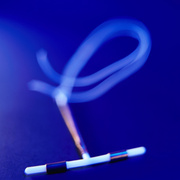 Spike Mafford/Photodisc/Thinkstock
Spike Mafford/Photodisc/Thinkstock
A hormonal intrauterine device (IUD) is a T-shaped plastic frame that releases a type of progestin which thickens the cervical mucus to prevent sperm from reaching or fertilizing an egg, reported Mayo Clinic.
The IUD is inserted into the uterus for long-term birth control. It’s effective for at least five years.
The form of progestin it releases is levonorgestrel. The Mirena IUD is one type but it is also known by its generic name, the levonorgestrel intrauterine system or LNG-IUS.
The hormonal IUD also keeps the lining of the uterus (endometrium) from growing very thick, wrote WebMD. This makes the lining a poor place for a fertilized egg to implant and grow. The hormones in this IUD also reduce menstrual bleeding and cramping.
Hormonal IUDs have been used around the world as contraceptives since the early 1990s. However, it’s only in the last few years that gynecologists have begun investigating their possible use for the treatment of endometriosis. IUDs have not been approved for this type of use in most countries, wrote Endometriosis.org.
The National Institutes of Health wrote that endometriosis is a health disorder that occurs when cells from the lining of the uterus grow in other areas of the body. This can lead to pain, irregular bleeding and infertility.
Since the hormonal IUD helps reduce the amount of blood flow during a woman's period, it may help to reduce endometriosis-related pain. In fact, the Mirena IUD is now FDA-approved to treat heavy periods. WebMD added that the hormonal IUD is less likely to cause side effects than high-dose progestin.
Several small clinical trials have investigated the effectiveness of the Mirena IUD for the treatment of endometriosis wrote About.com. This research showed the Mirena IUD may be helpful in reducing period pain over three years, with most of the improvement being in the first 12–18 months.
However there can be risks with the hormonal IUD. It may cause noncancerous growths called ovarian cysts, which usually go away on their own, according to WebMD.
It can also cause hormonal side effects similar to those caused by oral contraceptives. These include breast tenderness, mood swings, headaches, and acne. These are rare and usually go away after the first few months.
Endometriosis.org said if the hormonal IUD proves to be an effective long-term treatment for endometriosis, it offers several potential advantages over current treatments.
There are theoretically fewer side effects, no need to take daily tablets or have regular injections.
However, Endometriosis.org wrote, better-designed clinical trials are needed before its true role can be determined.
Sources:
"Dr. Deborah Wilson & Associates | eNewsletter." Dr. Deborah Wilson offering a laparoscopic hysterectomy solution and providing examination, diagnosis, treatment and care for women's health problems, pregnancy and aesthetic services.. N.p., n.d. Web. 22 May 2012. http://www.drwilsonobgyn.com/enews2011-02/index.html
"Insertion of the Mirena intrauterine... [Taiwan J Obstet Gynecol. 2010] - PubMed - NCBI." National Center for Biotechnology Information. N.p., n.d. Web. 22 May 2012.
http://www.ncbi.nlm.nih.gov/pubmed/20708521
"Treatment options for Endometriosis." Endometriosis - comprehensive advice and support for sufferers. N.p., n.d. Web. 22 May 2012.
http://www.endo-resolved.com/treatment.html
Wood, Ros. "Mirena « Endometriosis.org: The Global Forum." Endometriosis.org: The Global Forum. N.p., n.d. Web. 22 May 2012.
http://endometriosis.org/treatments/mirena
Stacey M.Ed LMHC, Dawn. "Endometriosis Treatment - Hormonal Contraception as Endometriosis Treatment." Contraception - Birth Control Methods - What is Contraception. N.p., n.d. Web. 24 May 2012. http://contraception.about.com/od/Benefits/f/Endometriosis-Treatment.htm
"Intrauterine Device (IUD) Birth Control and Side Effects." WebMD - Better information. Better health.. N.p., n.d. Web. 24 May 2012. http://www.webmd.com/sex/birth-control/intrauterine-device-iud-for-birth-control
Stacey M.Ed LMHC, Dawn. "Mirena - Learn about the Mirena IUD - Levonorgestrel IUD." Contraception - Birth Control Methods - What is Contraception. N.p., n.d. Web. 24 May 2012.
http://contraception.about.com/od/iud/a/mirena.htm
"Endometriosis - PubMed Health." National Center for Biotechnology Information. N.p., n.d. Web. 25 May 2012. http://www.ncbi.nlm.nih.gov/pubmedhealth/PMH0001913
"Mirena (hormonal IUD) - MayoClinic.com." Mayo Clinic. N.p., n.d. Web. 25 May 2012.
http://www.mayoclinic.com/health/mirena/MY00998
Reviewed May 25, 2012
by MIchele Blacksberg RN
Edited by Jody Smith





Add a CommentComments
There are no comments yet. Be the first one and get the conversation started!